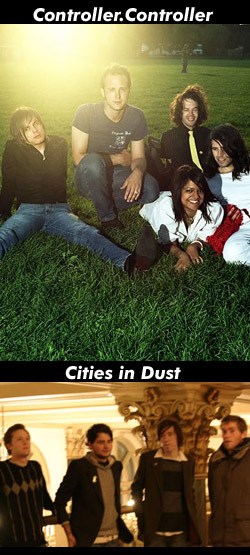This Friday, Sault boy Scott Kaija returns to town with Controller.Controller.
They'll be hitting the Downbeat on Friday, February 24 along with special guests Cities in Dust.
Show starts at 11 p.m. and there's a $10 cover charge at the door.
***************
Controller.Controller Bio
As Controller.Controller prepare to release their first full-length album, we are asked to consider the 'X-amounts'.
What are the elusive ingredients that set this band – and, perhaps more importantly, this record – apart from all others?
Where will this collection of songs take us?
This is, after all, the band that called its first EP, History, thus setting it along a continuum of music past, present and future.
Perhaps the key to X-Amounts is the way singer Nirmala Basnayake injects the frequently staccato rhythms with warmth, longing and memorable melodies.
When she pleads "Don't go" on the spare and eerie song, The Raw No, there's no specific destination leading her subject astray, but the danger of detachment is reason enough not to separate.
Maybe the heart of the band is wrapped within the tight confines of Ronnie Morris's bass lines, clinging unflinchingly to Jeff Scheven's disco beats while fighting off a laser-guided guitar assault.
While Scott Kaija and Colwyn Llewelyn-Thomas have a reputation for guitar lines that stab and dance, X-Amounts' Tigers Not Daughters begins with a rumbling riff that would do Slayer proud.
There are no easy answers to this equation.
So perhaps the essence of Controller.Controller isn't really for us to know.
The X-Amounts are infinite.
When asked about the meaning of 'X', Basnayake explains:
'X' is a placeholder for so much, from things dirty and forbidden to things that run along a straight edge.
'X' can symbolize a kiss but it can also symbolize poison.
'X' can announce resistance as well as crossing paths and crossroads.
'X' stands out and 'X' marks the spot.
'X' is a letter that can express the sound of a group of letters, like a phonetic union.
'X' is our common chromosome.
'X' can even indicate something that has been eliminated, something of the past, but this is not the case with us.
The future of this band is the undetermined 'X'; precisely because it is so, we can make it whatever we want.
With much of the past year spent touring with Death From Above 1979, VHS Or Beta, The Organ and numerous other bands, Controller.Controller cultivated the songs that form X-Amounts.
There's no better way to know what sounds good to an audience than by playing it live, so it makes sense that there's a flow to X-Amounts that only happens when a real connection is made.
And whether the connection is made on the dance floor in front of a stage or on headphones attached to an iPod, there's no doubt that in the end X amounts to Controller.Controller.
**************
About Cities in Dust
by James Hayashi-Tennant
I wanted to hate you but I couldn't
The creation of music is a process of power and mystery.
Not that rock bands are mysterious anymore – by now, anyone can imagine four lads in a basement, throwing ideas back and forth at one another, sharing guitar licks and steadying arrangements.
There's little mystery in that.
The mystery lies in a deeper part of the process, the part we cannot see.
Here is the point at which notes, chords, lyrics, sounds and even mistakes gel, and a song comes forward out of the chaos.
At this point, music still seems a form of alchemy.
The process can be so inexplicable that even those involved may not know where the music comes from.
Cities in Dust know the elements, the ingredients, that go into their music – but the outcome cannot be broken back down into those elements and traced back to the source.
In other words, when the four members of Cities in Dust write a song, it comes out sounding like Cities in Dust – but exactly how and why is beyond their ken.
Vocalist Zach Frank met Toye and the other band members separately, and eventually coaxed them all to form a band.
When they first met in bassist Craig Nordemann’s basement, it was a first-time meeting for Nordemann, Toye and drummer Matt Winters.
Four near-strangers in a basement with instruments, ideas and opinions…naturally, it could have gone badly.
Simply put, it did not.
Cities in Dust found some common ground in dance punk and dance rock, sharing an appreciation for the likes of Le Tigre and The Rapture; yet each individual fed their own flavours into this already murky cocktail of influence.
The music grew quicker, choppier, and more kinetic.
Drummer Matt Winters and bassist Craig Nordemann establish a solid and thunderous bottom end that acts as ballast for Simon Toye's wiry guitar that crisscrosses above; meanwhile, Zach Frank's tightly wound vocal springs like an elastic band, threatening to snap should it stretch any further.
The energy of the music and the performance began to draw interest from Hamilton audiences almost immediately.
Key Management impresario Dan Brooks took notice the first time he saw them, and soon had the band aboard. Brooks' involvement only intensified the hype that swells around the band.
'Hype' isn't really what Cities in Dust have received, though; 'buzz' is closer to appropriate.
'Hype' connotes an overstatement, while 'buzz' merely the chatter of the crowd.
For Cities in Dust, that crowd grows steadily, with every gig that passes.
**************
Controller.Controller
Cities in Dust
Downbeat Lounge
Join SooToday+
- Messages
- Post a Listing
- Your Listings
- Your Profile
- Your Subscriptions
- Your Likes
- Your Business
- Support Local News
- Payment History
SooToday+ members
Already a +member?
Not a +member?
Sign up for a SooToday+ account for instant access to upcoming contests, local offers, auctions and so much more.
